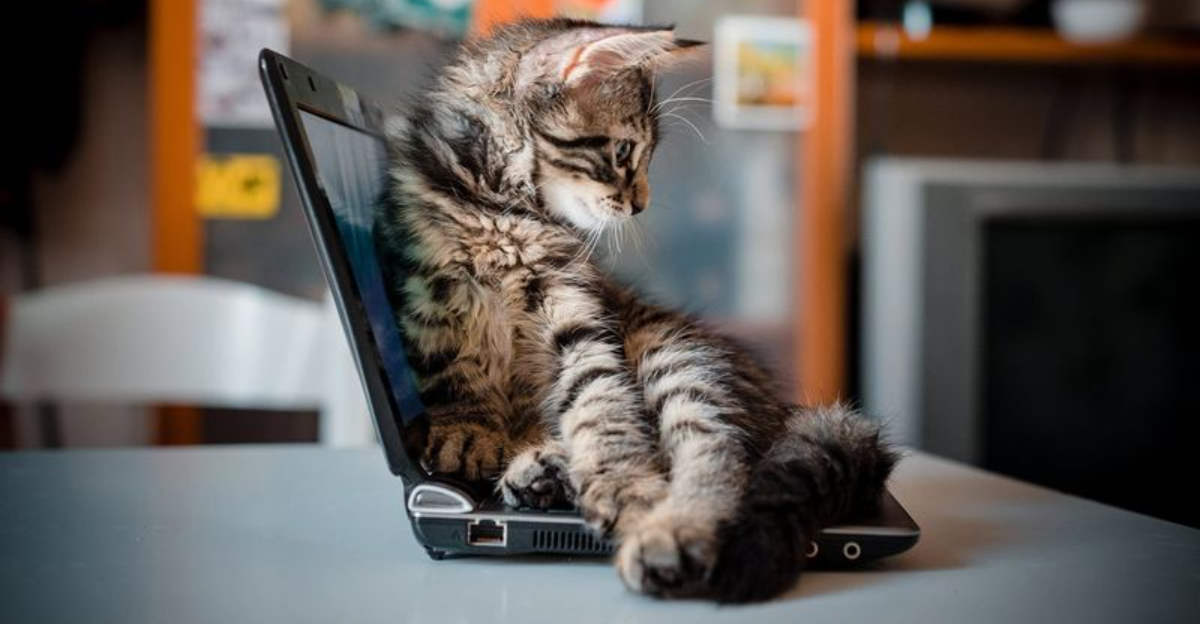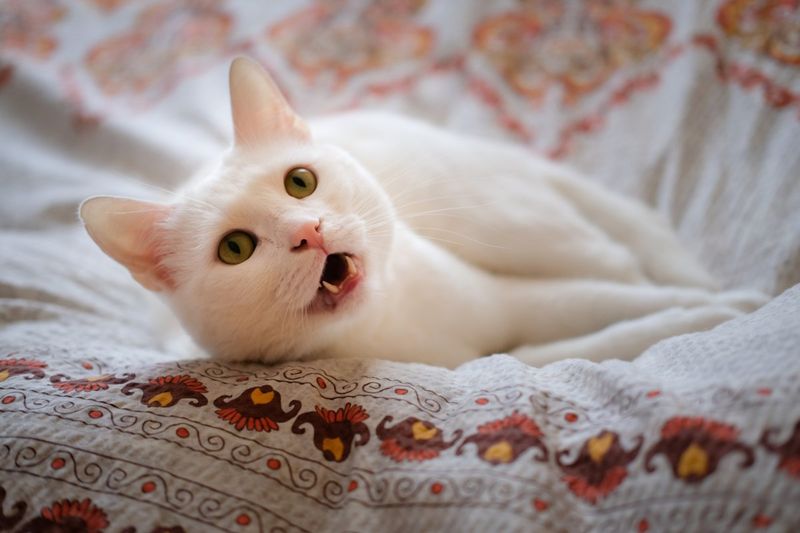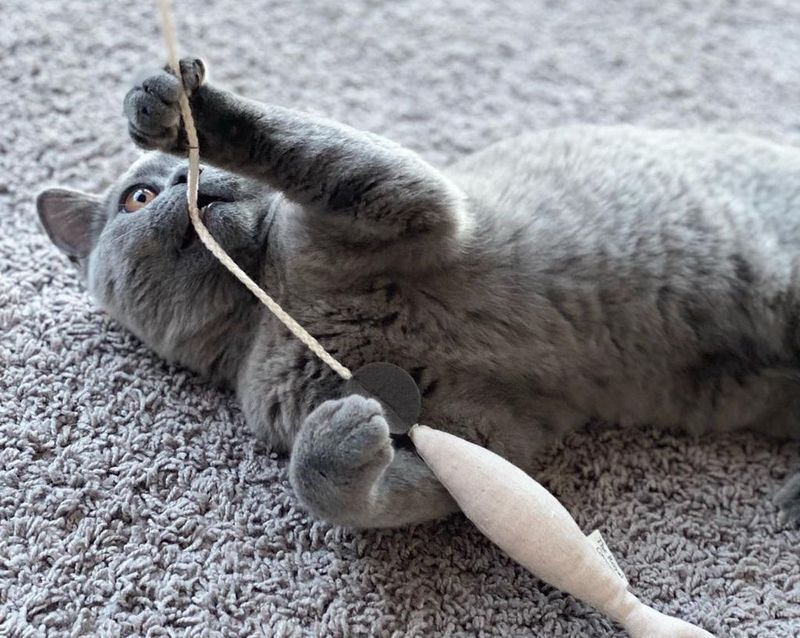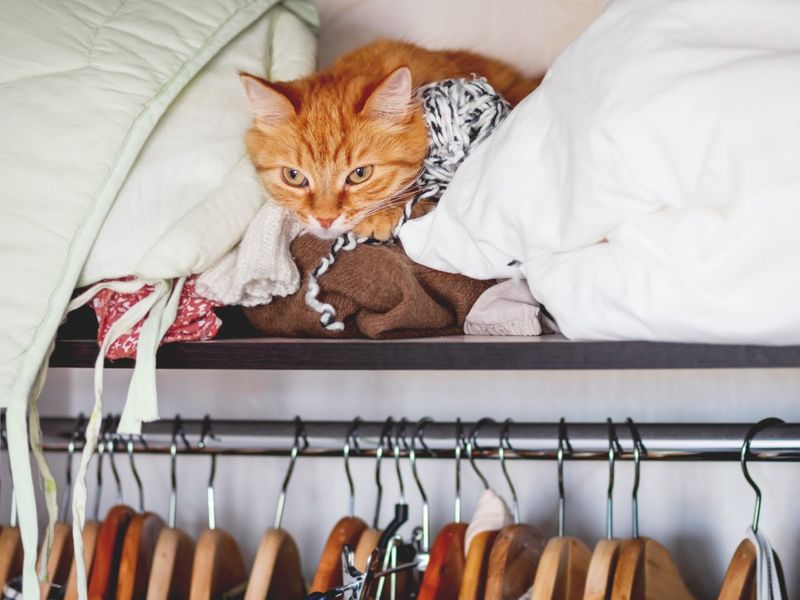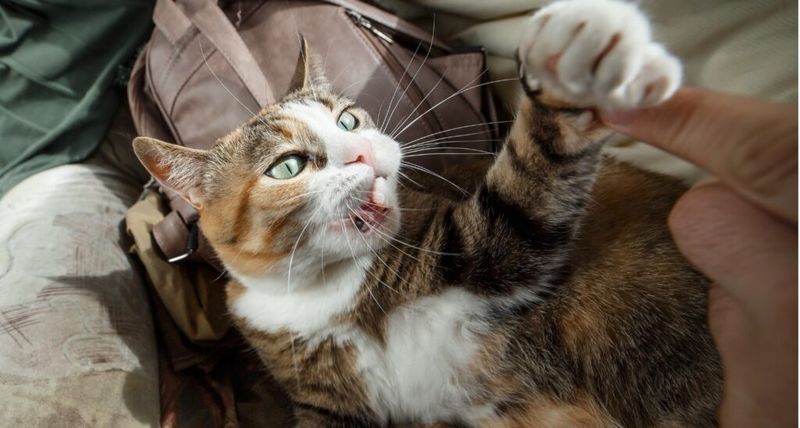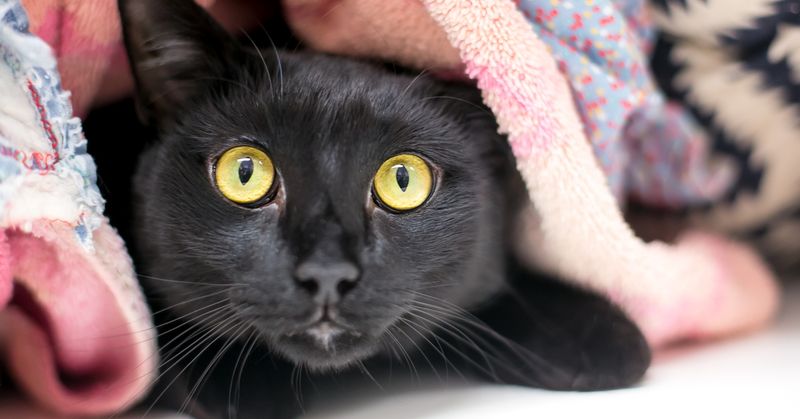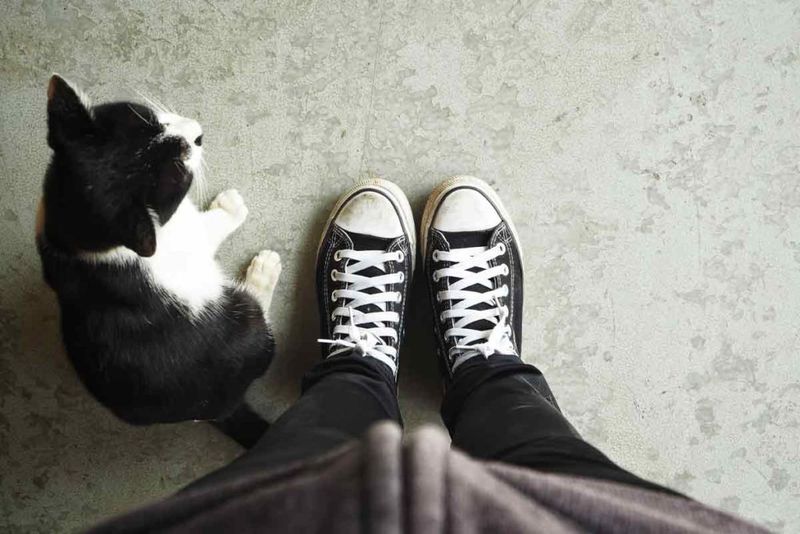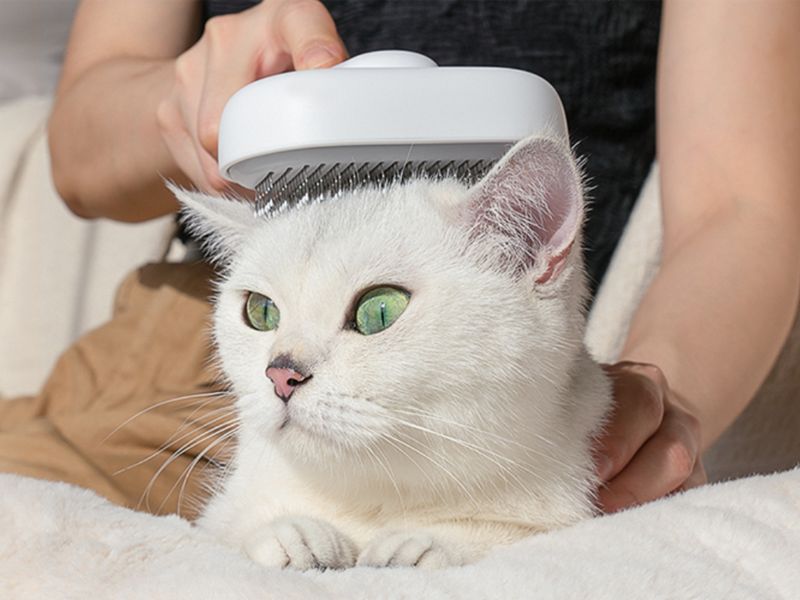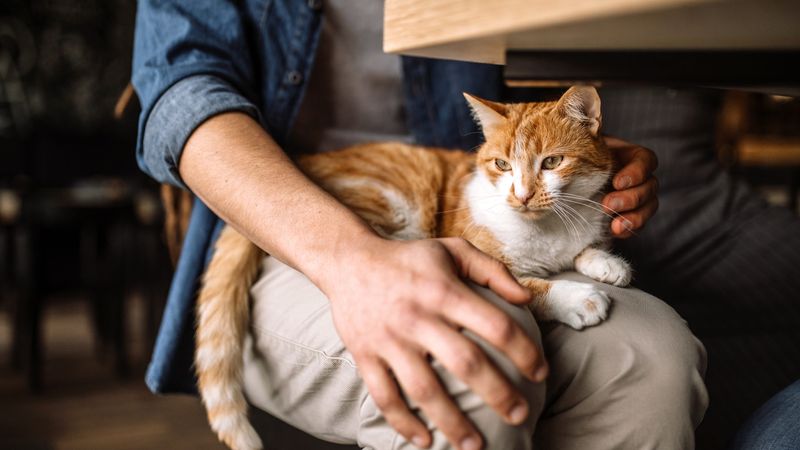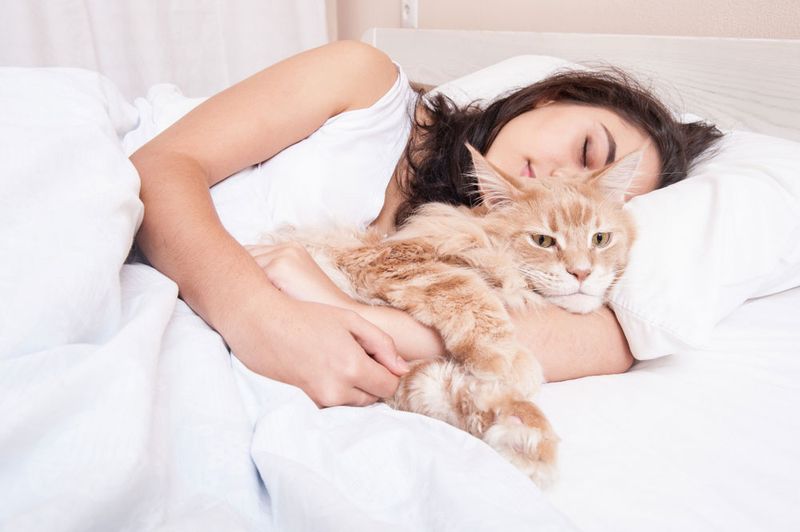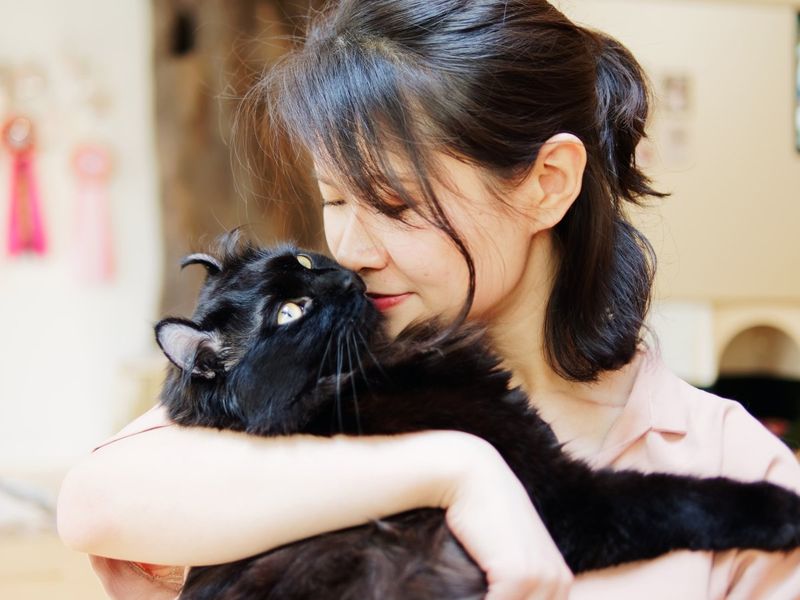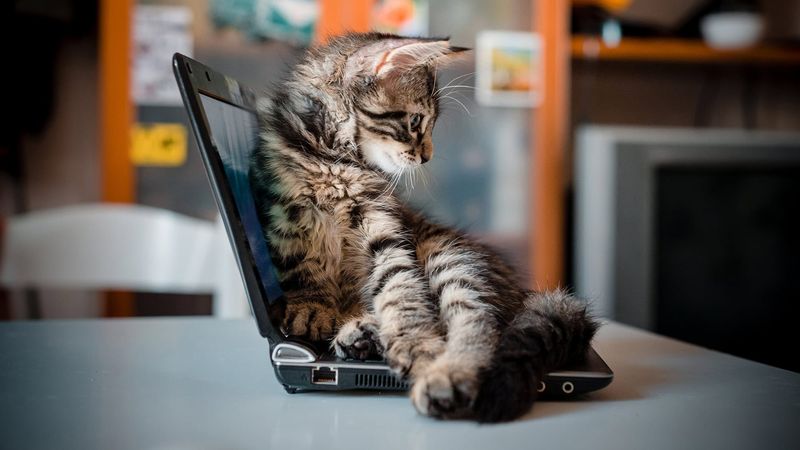📖 Table of Content:
- 1. Excessive Meowing When You Return
- 2. Bringing You “Gifts”
- 3. Sleeping On Your Clothes
- 4. Frantic Play Sessions After Absence
- 5. Intense Staring From Across The Room
- 6. Refusing To Leave Your Side
- 7. Excessive Grooming Of Your Hair Or Face
- 8. Kneading Your Lap More Intensely
- 9. Sleeping Position Changes
- 10. Increased Purring And Headbutting
- 11. Sitting On Your Personal Items
Cats are often seen as independent creatures who couldn’t care less about their humans. But beneath that aloof exterior beats the heart of an animal that forms deep bonds with their favorite people. When you’re away, your feline friend may actually miss you tremendously. They just show it differently than dogs do, with subtle signals that are easy to overlook. Here are the tell-tale signs your cat is counting the minutes until your return.
1. Excessive Meowing When You Return
Your normally quiet kitty suddenly turns into a chatterbox the moment you walk through the door. This vocal greeting isn’t just noise—it’s your cat’s way of expressing relief and excitement that you’re finally home.
Cats reserve special vocalizations for their favorite humans. The pitch and pattern often differ from their regular meows, creating a unique “welcome home” language just for you.
Some cats will even follow you around the house, meowing continuously as if telling you about everything that happened while you were gone. They’re essentially catching you up on their day!
2. Bringing You “Gifts”
Finding a toy mouse on your pillow or, more alarmingly, a real critter at your feet isn’t just your cat showing off hunting skills. These offerings are genuine tokens of affection from a pet who missed your presence.
Wild cat mothers teach their kittens to hunt by bringing them prey. When your cat brings you these items, they’re treating you as part of their family unit—someone they care for deeply.
The timing of these gifts often increases after you’ve been away. Your absence triggers their instinct to strengthen bonds through sharing resources, a deeply hardwired behavior in feline social structures.
3. Sleeping On Your Clothes
Ever return from a trip to find your cat has created a nest in your laundry basket? This isn’t random behavior. Your scent provides comfort to your feline friend during your absence.
Cats have incredibly powerful noses with over 200 million odor sensors. When they curl up on your sweater or pajamas, they’re surrounding themselves with your familiar smell, creating a sense of security when you’re not physically present.
The dirtier the clothes, the better! Recently worn items carry stronger scents, which explains why your cat might prefer your gym clothes over freshly laundered items. They’re seeking the strongest connection to you they can find.
4. Frantic Play Sessions After Absence
Cats store up energy and excitement during your absence. When you finally return, all that pent-up energy explodes into hyperactive play behavior that seems almost frenzied compared to their normal activity levels.
This sudden playfulness serves multiple purposes. Beyond burning stored energy, it’s a way for cats to reconnect with you through interaction. Play is a social bonding activity in the feline world.
Many cat owners notice their pets racing around the house at top speed or bringing toys for interactive play immediately after a reunion. This burst of activity is their way of celebrating your return and reestablishing your shared routine.
5. Intense Staring From Across The Room
Those unblinking eyes fixed on your every move after returning home aren’t just a casual observation. Your cat is drinking in your presence, reassuring themselves that you’re really back.
Cats communicate largely through eye contact and body language. The slow blink they might give you—often called a “cat kiss”—is a sign of deep trust and affection that increases after separation.
Long-distance staring sessions allow your cat to monitor you without physical contact. Some cats prefer this method of reconnection, especially if they’re still feeling a bit insecure or processing emotions about your absence and return.
6. Refusing To Leave Your Side
The bathroom buddy phenomenon intensifies after you’ve been away. Suddenly, your independent cat transforms into your shadow, following you from room to room without exception.
This clingy behavior stems from separation anxiety and the fear that you might disappear again. By maintaining visual contact, your cat reassures themselves that you’re still present and accessible.
Many cats will even adjust their daily routines to maximize time with you after a separation. A cat who normally spends afternoons in a sunny window might instead choose to nap beside your workspace, sacrificing comfort for closeness during this reconnection period.
7. Excessive Grooming Of Your Hair Or Face
Your cat’s sudden interest in licking your hair, face, or hands goes beyond typical grooming behavior. This is social grooming—a significant sign of affection and trust in the feline world.
Mutual grooming strengthens bonds between cats in colonies. When your pet extends this behavior to you after a separation, they’re reestablishing your connection and marking you with their scent.
The rhythmic licking also releases endorphins that help calm your cat’s anxiety about your absence. While it might feel rough on your skin, this grooming session provides emotional comfort to your cat and helps them process the stress they felt while you were gone.
8. Kneading Your Lap More Intensely
Those little paws working overtime on your lap after you return home are expressing deep contentment and security. Kneading—often called “making biscuits”—intensifies when cats are processing strong emotions, including relief at your return.
This behavior originates from kittenhood when nursing kittens knead their mother’s belly to stimulate milk flow. When adult cats do this to you, they’re displaying their most vulnerable, kitten-like state of trust and dependence.
The intensity and duration of kneading often increase proportionally to how long you’ve been away. A weekend trip might earn you a few minutes of gentle kneading, while a longer absence could result in an extended, more vigorous session.
9. Sleeping Position Changes
Cats are creatures of habit, especially regarding sleep locations. A cat who suddenly abandons their favorite spot to sleep pressed against you is sending a clear message about their need for closeness after separation.
Body positioning speaks volumes, too. A cat who stretches out alongside you, exposing their vulnerable belly, or who insists on sleeping near your face, is displaying maximum trust and connection.
Night-time neediness often increases after you’ve been away. Even cats who normally sleep at the foot of the bed might relocate to your pillow or drape themselves across your chest, seeking the reassurance of your heartbeat and breathing patterns during those vulnerable sleeping hours.
10. Increased Purring And Headbutting
The rumbling engine of purrs combined with forceful headbutts represents your cat’s most direct expression of “I missed you.” These behaviors release feel-good hormones for both of you, helping rebuild your bond after time apart.
Headbutting (or bunting) leaves scent markers from glands in your cat’s face onto your skin. This territorial marking essentially labels you as “their human” again after you’ve been mingling with outside scents.
The volume and vibration intensity of purring often increase dramatically during reunion periods. These super-charged purrs serve as self-soothing mechanisms for cats experiencing the emotional rollercoaster of separation and reunion with their favorite person.
11. Sitting On Your Personal Items
Your laptop, books, phone, or recently used coffee mug suddenly become your cat’s favorite perching spots after you’ve been away. This isn’t random obstruction—it’s a calculated move to be close to objects carrying your fresh scent.
Cats understand that frequently-touched items contain concentrated traces of your unique smell. By sitting on these objects, they’re both absorbing your scent and mixing it with their own, creating a comforting blend of your shared identities.
The timing is significant, too. Many cats will ignore these items while you’re actively using them, but pounce the moment you set them down. They’re seeking the warmth and fresh scent you’ve just imparted to the object.
